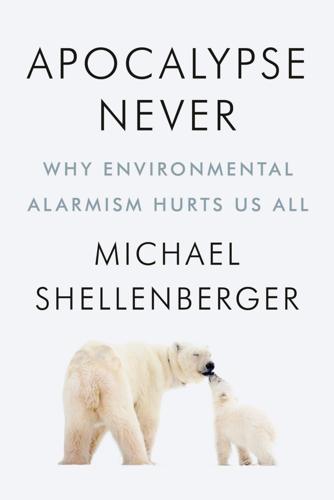
Apocalypse Never: Why Environmental Alarmism Hurts Us All
by
Michael Shellenberger
Published 28 Jun 2020
An Economic Analysis of 20th Century Whaling,” Biodiversity and Conservation 13 (2004): 453–562, https://doi.org/10.1023/B:BIOC.0000009489.08502.1a. 33. Ibid. 34. Ibid. 35. Tønnessen and Johnsen, The History of Modern Whaling, 136. 36. Viktoria Schneider and David Pearce, “What Saved the Whales? An Economic Analysis of 20th Century Whaling.” 37. Davis et al., In Pursuit of Leviathan, 512. 38. Linus Blomqvist, Ted Nordhaus, and Michael Shellenberger, Nature Unbound: Decoupling for Conservation, The Breakthrough Institute, 2015, accessed December 5, 2019, 29, https://s3.us-east-2.amazonaws.com/uploads.thebreakthrough.org/legacy/images/pdfs/Nature_Unbound.pdf. 39. Schneider and Pearce, “What Saved the Whales? An Economic Analysis of 20th Century Whaling.”
…
Masaharu Tsubokura, Shuhei Nomura, Kikugoro Sakaihara et al., “Estimated Association Between Dwelling Soil Contamination and Internal Radiation Contamination Levels After the 2011 Fukushima Daiichi Nuclear Accident in Japan,” BMJ Open 6, no. 6 (June 29, 2016), https://bmjopen.bmj.com/content/bmjopen/6/6/e010970.full.pdf. 116. Michel Berthélemy and Lina Escobar Rangel, “Nuclear Reactors’ Construction Costs: The Role of Lead-Time, Standardization and Technological Progress,” Energy Policy 82 (July 2015): 118–30, https://doi.org/10.1016/j.enpol.2015.03.015. 117. Jessica R. Lovering, Arthur Yip, and Ted Nordhaus, “Historical Construction Costs of Global Nuclear Power Reactors,” Energy Policy 91 (April 2016): 371–81, https://doi.org/10.1016/j.enpol.2016.01.011. When the reactors in this study are grouped by reactor type, the average overnight capital costs are lowest for pressurized and boiling-water reactors and greater for heavy-water reactors and gas-cooled reactors.
…
John van Zalk and Paul Behrens, “The spatial extent of renewable and non-renewable power generation: A review and meta-analysis of power densities and their application in the US,” Energy Policy 123 (2018): 83–91, https://doi.org/10.1016/j.enpol.2018.08.023. 97. Ibid., 83–91. 98. Jesse Jenkins, Mark Moro, Ted Nordhaus et al., Beyond Boom & Bust: Putting Clean Tech on a Path to Subsidy Independence, Breakthrough Institute, April 2012, https://s3.us-east-2.amazonaws.com/uploads.thebreakthrough.org/articles/beyond-boom-and-bust-report-overview/Beyond_Boom_and_Bust.pdf, 18. 99. Tom Jackson, “PacificCorp Sues to Block Release of Bird-Death Data at Wind Farms,” Sandusky Register, November 17, 2014, http://www.sanduskyregister.com. 100.
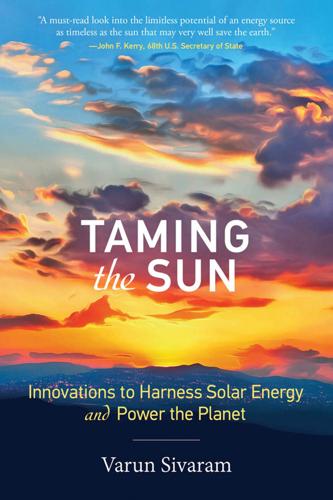
Taming the Sun: Innovations to Harness Solar Energy and Power the Planet
by
Varun Sivaram
Published 2 Mar 2018
But these steps can be dead ends, the experts say, rather than on-ramps, for integrating people at the bottom of the pyramid into the modern economy.7 Becoming productive members of that economy, and reaping its benefits, tend to go hand in hand with a threshold level of annual electricity consumption—on the order of several thousand kilowatt-hours per capita, which far exceeds the amount of electricity that simple off-grid solar systems can deliver. Morgan Bazilian at the World Bank argues that on top of increasing the number of people with an electrical connection, it is crucial to increase the quantity of electricity used in homes and businesses to power economic growth.8 Taking all this into account, Ted Nordhaus, Shaiyra Devi, and Alex Trembath at the Breakthrough Institute argue that “decentralized renewable and off-grid energy technologies … cannot, however, substitute for energy and other infrastructure necessary to support industrial-scale economic enterprise. Microfinance, microenterprise, and microenergy are no substitute for industry, infrastructure, and grid electricity.”9 I respect the judgment of these experts, and, through many conversations, they have certainly convinced me that off-grid solar has played a negligible role in the tremendous progress made to date in lifting people out of poverty in the industrializing world.
…
Mark Caine et al., “Our High Energy Planet,” Breakthrough Institute, April 2014, http://thebreakthrough.org/images/pdfs/Our-High-Energy-Planet.pdf. 8. Morgan Bazilian and Roger Pielke, “Making Energy Access Meaningful,” Issues in Science and Technology 29 (4): 74–78, http://sciencepolicy.colorado.edu/admin/publication_files/2013.22.pdf. 9. Ted Nordhaus, Shaiyra Devi, and Alex Trembath, “Debunking Microenergy: The Future Lies with Urbanization,” Foreign Affairs, August 2016, https://www.foreignaffairs.com/articles/2016-08-30/debunking-microenergy. 10. Peter Alstone, Dimitry Gershenson, and Daniel M. Kammen, “Decentralized Energy Systems for Clean Electricity Access,” Nature Climate Change 5, no. 4 (2015): 305–314, doi:10.1038/nclimate2512. 11.
…
Staffell, “The Future Cost of Electrical Energy Storage Based on Experience Rates,” Nature Energy 2 (2017), doi: 10.1038/nenergy.2017.110. 33. Arnulf Grubler, “The Costs of the French Nuclear Scale-Up: A Case of Negative Learning by Doing,” Energy Policy 38, no. 9 (2010): 5174–5188, doi:10.1016/j.enpol.2010.05.003. 34. Ted Nordhaus, Jessica Lovering, and Michael Shellenberger, “How To Make Nuclear Cheap,” The Breakthrough Institute, June 2014, https://thebreakthrough.org/images/pdfs/Breakthrough_Institute_How_to_Make_Nuclear_Cheap.pdf 35. Brad Plumer, “How Carbon Capture Could Become a Rare Bright Spot on Climate Policy in the Trump Era,” Vox, April 12, 2017, http://www.vox.com/energy-and-environment/2017/4/12/15269628/carbon-capture-trump. 36.
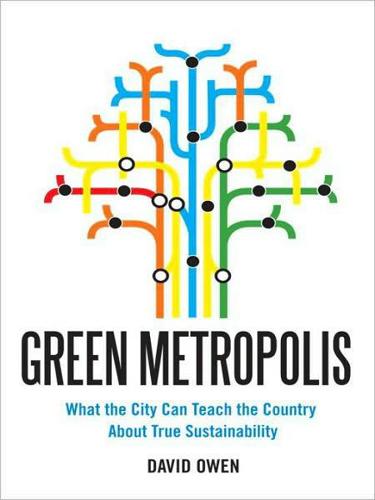
Green Metropolis: Why Living Smaller, Living Closer, and Driving Less Are Thekeys to Sustainability
by
David Owen
Published 16 Sep 2009
By the time Vladimir Putin ratified the protocol, in 2004, Russia was already certain to meet its goal for 2012. The countries with the best emissions-reduction records—Ukraine, Latvia, Estonia, Lithuania, Bulgaria, Romania, Hungary, Slovakia, Poland, and the Czech Republic—were all parts of the Soviet empire and therefore look good for the same reason. Ted Nordhaus and Michael Shellenberger, in their 2007 book Break Through: From the Death of Environmentalism to the Politics of Possibility, write, “Germany and Britain have reduced their emissions, but most of those reductions were due to the collapse of the British coal-mining industry in the 1980s and the collapse of East German heavy industry and power generation after the reunification of Germany.
…
From the macaroni box: “As the stewards of our fragile planet, we humans need to unite and speak out on behalf of all of Earth’s inhabitants—from plankton to polar bears to whales to redwoods. We are all interconnected. We all share the same home. Displaying a BE GREEN sticker gives you this voice.” 48 Ted Nordhaus and Michael Shellenberger, Break Through: From the Death of Environmentalism to the Politics of Possibility (Boston: Houghton Mifflin, 2007), pp. 113-14. 49 Doug Struck, “Canada Alters Course on Kyoto,” The Washington Post, May 3, 2006. 2. Liquid Civilization 1 Neela Banerjee, “Many Feeling Pinch After Newest Surge in U.S.
…
Scientific American , February 5, 2008. A brief version of this article appeared in the April 2008 issue of the magazine; a longer version appears online at: www.sciam.com. 19 François Leydet, The Last Redwoods and the Parkland of Redwood Creek (San Francisco: Sierra Club, 1963), p. 132, quoted in Ted Nordhaus and Michael Shellenberger, Break Through: From the Death of Environmentalism to the Politics of Possibility (Boston: Houghton Mifflin, 2007), p. 26. 20 Statistics from the National Park Service, quoted in “Environmental Awareness,” The Economist, February 8, 2007. “No park, it seems, is immune to the decline: even in Yosemite, one of the system’s oldest parks and probably its best known, the number of visitors dropped 17% over the ten-year period.
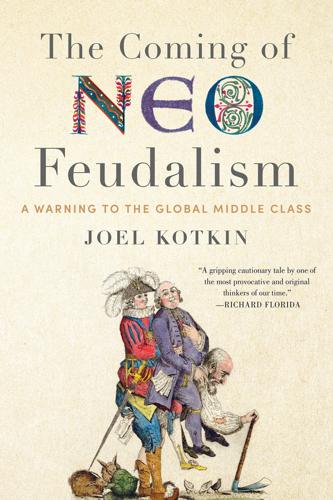
The Coming of Neo-Feudalism: A Warning to the Global Middle Class
by
Joel Kotkin
Published 11 May 2020
This Is Why,” Global Citizen, April 25, 2018, https://www.globalcitizen.org/en/content/india-day-zero-clean-water-access-shortage/; Hannah Daly, “1.1 billion people still lack electricity. This could be the solution,” World Economic Forum, June 20, 2018, https://www.weforum.org/agenda/2018/06/1-billion-people-lack-electricity-solution-mini-grid-iea/. 37 Ted Nordhaus, “Impossible Environmentalism: Green groups promote utopian fantasies,” USA Today, September 7, 2017, https://www.usatoday.com/story/opinion/2017/09/07/impossible-environmentalism-does-not-address-sustainability-ted-nordhaus-column/570651001/. 38 Lewis Page, “Renewable energy ‘simply won’t work’: Top google engineers,” Register, November 21, 2014, https://www.theregister.co.uk/2014/11/21/renewable_energy_simply_wont_work_google_renewables_engineers/; Lewis Page, “Renewable energy can’t do the job.
…
Leaders in countries such as India tend to be more concerned about the availability of energy than about reducing greenhouse gas emissions.36 Investing in Resilience In order to ind effective solutions to climate change and other problems, the environmental movement needs to give up “utopian fantasies,” writes Ted Nordhaus, a longtime California environmentalist, and “make its peace with modernity and technology.”37 Given existing technologies, the much-anticipated shift to solar and wind energy seems largely impractical as a way of cutting emissions without dramatically raising energy costs, reducing reliability, and increasing poverty.

Elsewhere, U.S.A: How We Got From the Company Man, Family Dinners, and the Affluent Society to the Home Office, BlackBerry Moms,and Economic Anxiety
by
Dalton Conley
Published 27 Dec 2008
Ronald Inglehart, The Silent Revolution: Changing Values and Political Styles Among Western Publics (Princeton, N.J.: Princeton University Press, 1977). See also Ronald Inglehart, “The Silent Revolution in Post-Industrial Societies,” American Political Science Review 65 (1971): 991-1017. Ted Nordhaus and Michael Shellenberger elaborate on Inglehart’s concept in their book Break Through to suggest that we now live in a condition of “insecure affluence.” See, Ted Nordhaus and Michael Shellenberger, Break Through: From the Death of Environmentalism to the Politics of Possibility (New York: Houghton Mifflin, 2007). 2. Fred Hirsch, The Social Limits to Growth (London: Routledge & Kegan Paul, 1976). 3.

The Filter Bubble: What the Internet Is Hiding From You
by
Eli Pariser
Published 11 May 2011
But once we’re in it, the process of matching who we are to content streams can lead to the erosion of common experience, and it can stretch political leadership to the breaking point. Discourse and Democracy The good news about postmaterial politics is that as countries become wealthier, they’ll likely become more tolerant, and their citizens will be more self-expressive. But there’s a dark side to it too. Ted Nordhaus, a student of Inglehart’s who focuses on postmaterialism in the environmental movement, told me that “the shadow that comes with postmaterialism is profound self-involvement.... We lose all perspective on the collective endeavors that have made the extraordinary lives we live possible.” In a postmaterial world where your highest task is to express yourself, the public infrastructure that supports this kind of expression falls out of the picture.
…
Harris, “Facebook’s Advertising Fluke,” TechRepublican, Dec. 21, 2010, accessed Feb. 9, 2011, http://techrepublican.com/free-tagging/vincent-harris. 155 have the ads pulled off the air: Monica Scott, “Three TV Stations Pull ‘Demonstrably False’ Ad Attacking Pete Hoekstra,” Grand Rapids Press, May 28, 2010, accessed Dec. 17, 2010, www.mlive.com/politics/index.ssf/2010/05/three_tv_stations_pull_demonst.html. 157 “improve the likelihood that a registered Republican”: Bill Bishop, The Big Sort: Why the Clustering of Like-Minded America Is Tearing Us Apart (New York: Houghton Mifflin, 2008), 195. 157 “likely to be most salient in the politics”: Ronald Inglehart, Modernization and Postmodernization (Princeton: Princeton University Press, 1997), 10. 159 Pabst began to sponsor hipster events: Neal Stewart, “Marketing with a Whisper,” Fast Company, Jan. 11, 2003, accessed Jan. 30, 2011, www.fastcompany.com/fast50_04/winners/stewart.html. 159 “$44 in US currency”: Max Read, “Pabst Blue Ribbon Will Run You $44 a Bottle in China,” Gawker, July 21, 2010, accessed Feb. 9, 2011, http://m.gawker.com/5592399/pabst-blue-ribbon-will-run-you-44-a-bottle-in-china. 160 “I serve as a blank screen”: Barack Obama, The Audacity of Hope: Thoughts on Reclaiming the American Dream (New York: Crown, 2006), 11. 161 “We lose all perspective”: Ted Nordhaus, phone interview with author, Aug. 31, 2010. 162 “the source is basically in thought”: David Bohm, Thought as a System (New York: Routledge, 1994) 2. 163 “participants in a pool of common meaning”: David Bohm, On Dialogue (New York: Routledge, 1996), x–xi. 164 “define and express its interests”: John Dewey, The Public and Its Problems (Athens, OH: Swallow Press, 1927), 146.
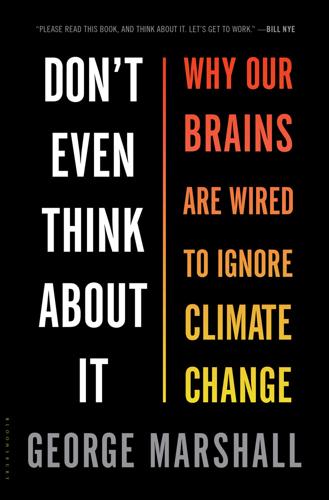
Don't Even Think About It: Why Our Brains Are Wired to Ignore Climate Change
by
George Marshall
Published 18 Aug 2014
In a remarkable piece of circular logic, Myron Ebell of the free-market Competitive Enterprise Institute sees the environmentalist dominance as the ultimate proof that climate change is a fraud: “If it were an actual problem with real science behind it, then the environmentalists would not be able to take it over. It would have become a mainstream issue, and serious people would have discussed how to solve it.” Ted Nordhaus, the co-founder of the Breakthrough Institute, has built a reputation as an environmental heretic, though he prefers to call himself an “outlier” and “ecological modernist.” He argues that environmentalists have proven to be “pretty well irrelevant,” to have had “absolutely no impact,” and to have “defined the space in such a way that it is very hard for other people to come in.”
…
John, Cyndi Wright, Dan Gilbert, Dan Kahan, Daniel Kahneman, David Buckland, David Hone, David Reiner, Debra Medina and the members of the Texan Tea Party, Deyan Sudjic, Dina Long, Eamon Ryan, Erin Biviano, Erin Taylor, Eviatar Zerubavel, Frank Bain, Frank Maisano, Frederic Luskin, Gavin Schmidt, George Loewenstein, Gill Ereaut, Ginny Pickering, James Hansen, Jennifer Morgan, Jennifer Walker, Jeremy Leggett, Jim Riccio, Joanna Macy, Joe Romm, Joel Hunter, John Adams, John Ashton, John Charmley, Juliet Schor, Kalee Kreider, Kert Davies, Kevin Anderson, Kevin Wall, Keya Chatterjee, Kirk Johnson, Laura Storm, Marc Morano, Martin Bursik, Matthew Nisbet, Michael Brune, Michael Dobkowski, Michael Mann, Michael Marx, Michael Salvato, Myron Ebell, Oliver Bernstein, Oliver Tickell, Patrick Reinsborough, Paul Slovic, Peter Kuper, Renee Lertzman, Richard Mueller, Ross Gelbspan, Sabine Marx, Sally Bingham, Sam Kazman, Sandy Dunlop, Stephen Lea, Steve Kretzmann, Ted Nordhaus, Thomas Schelling, Tim Nicholson, Tom Athanasiou, Vinay Gupta, Wendy Escobar. I am immensely grateful for the support of so many others in the course of this project and my travels—people who have advised me on contacts and contracts, shared ideas and insights, put me up, and put up with me! Thank you again for your generosity.
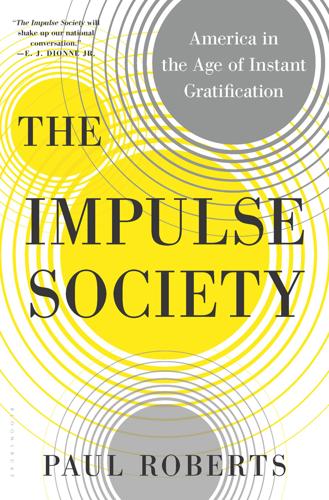
The Impulse Society: America in the Age of Instant Gratification
by
Paul Roberts
Published 1 Sep 2014
As prosperity faltered, we now found ourselves in a paradoxical position. Most Americans were still much wealthier than their grandparents had been. But our ascent had stopped: we could no longer count on advancing economically as rapidly as those earlier generations had. Many of us had entered what Ted Nordhaus and Michael Shellenberger have called a state of “insecure affluence,” where our material needs were still largely met, but our desires for better status, or more self-esteem, or other postmaterial aspirations, were being thwarted, which left us angry, anxious, and ready to blame someone. And yet, while such anger and anxiety, twenty years earlier, might have motivated us to take political action, the current culture pushed us in another direction.
…
“S&P 500: Total and Inflation-Adjusted Historical Returns,” Simple Stock Investing, http://www.simplestockinvesting.com/SP500-historical-real-total-returns.htm. 7. William Lazonick and Mary O’Sullivan, “Maximizing Shareholder Value: A New Ideology for Corporate Governance,” Economy and Society 29, no. 1 (Feb. 2000): 19. 8. Ibid. 9. Ted Nordhaus and Michael Shellenberger, Break Through: From the Death of Environmentalism to the Politics of Possibility, p. 156. 10. “Work Stoppages Falling,” graph, U.S. Bureau of Labor Statistics, http://old.post-gazette.com/pg/images/201302/20130212work_stoppage600.png. 11. Loukas Karabarbounis and Brent Neiman, “Declining Labor Shares and the Global Rise of Corporate Savings,” research paper, October 2012, http://econ.sciences-po.fr/sites/default/files/file/cbenard/brent_neiman_LabShare.pdf. 12.
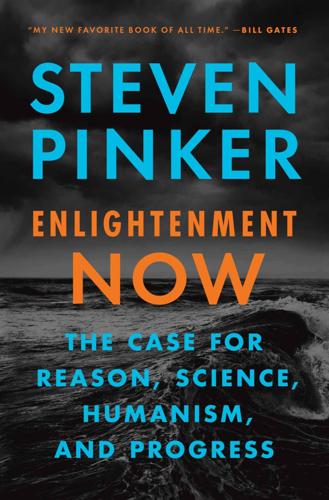
Enlightenment Now: The Case for Reason, Science, Humanism, and Progress
by
Steven Pinker
Published 13 Feb 2018
I also profited from comments by experts who read chapters or excerpts, including Scott Aronson, Leda Cosmides, Jeremy England, Paul Ewald, Joshua Goldstein, A. C. Grayling, Joshua Greene, Cesar Hidalgo, Jodie Jackson, Lawrence Krauss, Branko Milanović, Robert Muggah, Jason Nemirow, Matthew Nock, Ted Nordhaus, Anthony Pagden, Robert Pinker, Susan Pinker, Stephen Radelet, Peter Scoblic, Martin Seligman, Michael Shellenberger, and Christian Welzel. Other friends and colleagues answered questions or made important suggestions, including Charleen Adams, Rosalind Arden, Andrew Balmford, Nicolas Baumard, Brian Boutwell, Stewart Brand, David Byrne, Richard Dawkins, Daniel Dennett, Gregg Easterbrook, Emily-Rose Eastop, Nils Petter Gleditsch, Jennifer Jacquet, Barry Latzer, Mark Lilla, Karen Long, Andrew Mack, Michael McCullough, Heiner Rindermann, Jim Rossi, Scott Sagan, Sally Satel, and Michael Shermer.
…
Curing a body of cancer requires radical and invasive therapy, and therefore, curing the biosphere of the human virus will also require a radical and invasive approach.”2 Recently an alternative approach to environmental protection has been championed by John Asafu-Adjaye, Jesse Ausubel, Andrew Balmford, Stewart Brand, Ruth DeFries, Nancy Knowlton, Ted Nordhaus, Michael Shellenberger, and others. It has been called Ecomodernism, Ecopragmatism, Earth Optimism, and the Blue-Green or Turquoise movement, though we can also think of it as Enlightenment Environmentalism or Humanistic Environmentalism.3 Ecomodernism begins with the realization that some degree of pollution is an inescapable consequence of the Second Law of Thermodynamics.
…
Most important, the sacrifice needed to bring carbon emissions down by half and then to zero is far greater than forgoing jewelry: it would require forgoing electricity, heating, cement, steel, paper, travel, and affordable food and clothing. Climate justice warriors, indulging the fantasy that the developing world will do just that, advocate a regime of “sustainable development.” As Shellenberger and Ted Nordhaus satirize it, that consists of “small co-ops in the Amazon forest where peasant farmers and Indians would pick nuts and berries to sell to Ben and Jerry’s for their ‘Rainforest Crunch’ flavor.”61 They would be allowed solar panels that could light an LED or charge a cell phone, but nothing more.

A Small Farm Future: Making the Case for a Society Built Around Local Economies, Self-Provisioning, Agricultural Diversity and a Shared Earth
by
Chris Smaje
Published 14 Aug 2020
Arguments in the form of ‘only the capacity of capitalism to innovate technological solutions can now save us’ therefore neglect the fact that the social and economic logic underlying modern societies continues to generate GHGs despite these societies’ high levels of innovativeness. In a recent article, Ted Nordhaus put his finger on the dilemma: ‘the only remotely plausible path to the sorts of changes that many environmentalists now demand, such as zero net emissions by 2030, or stabilizing global temperatures at 1.5 degrees Centigrade above preindustrial levels, would require top-down, centralized, technocratic measures that most environmentalists are unwilling to seriously embrace’.27 That’s probably true.
…
As ex-CIA director James Woolsey has written, in a world with a 2 metre (~6 foot) sea level rise – which is eminently likely within a century under current emissions trends – ‘it will take extraordinary effort for the United States, or indeed any country, to look beyond its own salvation’.36 In other words, political uncertainties are looming that undermine confidence in the possibilities for centralised, technocratic climate change mitigation of the kind favoured by Ted Nordhaus. So, short of some eleventh-hour techno-fix, the present climate crisis suggests a need to think seriously about local, labour-intensive, small-scale farming economies as an adaptive response. One aspect of this thinking is suggested by Emma Marris when she equates consumption and morality. If it requires an ‘unprecedented improvement in our moral character’ to consume less, this suggests that consuming large quantities of material things must be morally suspect, but also an unavoidable human failing.

Break Through: Why We Can't Leave Saving the Planet to Environmentalists
by
Michael Shellenberger
and
Ted Nordhaus
Published 10 Mar 2009
Contents * * * Title Page Contents Copyright Dedication From the Nightmare to the Dream The Politics of Limits The Birth of Environmentalism The Forest for the Trees Interests Within Interests The Prejudice of Place The Pollution Paradigm The Death of Environmentalism The Politics of Possibility Status and Security Belonging and Fulfillment Pragmatism Greatness In Gratitude Notes Bibliography Index Connect with HMH Copyright © 2007 by Ted Nordhaus and Michael Shellenberger ALL RIGHTS RESERVED For information about permission to reproduce selections from this book, write to trade.permissions@hmhco.com or to Permissions, Houghton Mifflin Harcourt Publishing Company, 3 Park Avenue, 19th Floor, New York, New York 10016. hmhco.com The Library of Congress has cataloged the print edition as follows: Nordhaus, Ted. Break through: from the death of environmentalism to the politics of possibility / Ted Nordhaus and Michael Shellenberger. p. cm. Includes bibliographical references and index.
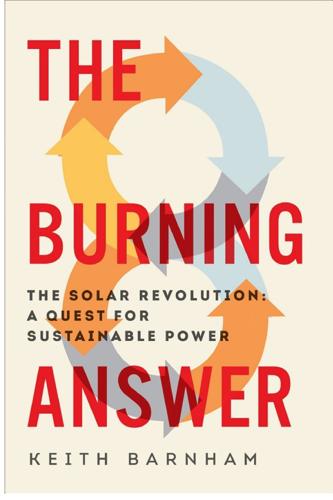
The Burning Answer: The Solar Revolution: A Quest for Sustainable Power
by
Keith Barnham
Published 7 May 2015
It will also help you appreciate how complementary the solar technologies are in supplying our electricity. We will also need some physics in Part II to counter the arguments of those who oppose the solar revolution. Many people find the debate about energy options extremely confusing. Here is a typical argument from two commentators, Ted Nordhaus and Michael Shellenberger, in The Wall Street Journal on 22 May 2013. They are clearly sceptical about renewable energy and critical of two solar supporters, Robert F. Kennedy Jr of the Natural Resources Defense Council and Bill McKibben, who had been writing in The Daily Beast. You can find the reference to this, and other quotations, in the Bibliography.
…
, Da Capo Press Inc. (2009). 3. Bill Bryson, A Short History of Nearly Everything, Doubleday (2003). 4. Jeremy Leggett, Half Gone: Oil, Gas, Hot Air and the Global Energy Crisis, Portobello Books (2005). 5. Jeremy Leggett, The Energy of Nations: Risk Blindness and the Road to Renaissance, Routledge (2014). 6. Ted Nordhaus and Michael Shellenberger, ‘Going Green? Then Go Nuclear’, Wall Street Journal, 22 May 2013, http://online.wsj.com/news/articles/SB100014241278873237163045784826634914263 12, accessed 10 December 2013. 7. K.W.J. Barnham, D. Hart, J. Nelson and R.A. Stevens, ‘Production and destination of British civil plutonium’, Nature, 317, 213 (1985). 8.

This Changes Everything: Capitalism vs. The Climate
by
Naomi Klein
Published 15 Sep 2014
Dan Kahan et al., “The Tragedy of the Risk-Perception Commons: Culture Conflict, Rationality Conflict, and Climate Change,” Cultural Cognition Project Working Paper No. 89, 2011, pp. 15-16, available at http://culturalcognition.net; Umair Irfan, “Report Finds ‘Motivated Avoidance’ Plays a Role in Climate Change Politics,” ClimateWire, December 19, 2011; Irina Feygina, John T. Jost, and Rachel E. Goldsmith, “System Justification, the Denial of Global Warming, and the Possibility of ‘System-Sanctioned Change,’ ” Personality and Social Psychology Bulletin 36, (2010): 336. 62. Ted Nordhaus and Michael Shellenberger, “The Long Death of Environmentalism,” Breakthrough Institute, February 25, 2011; Michael Shellenberger and Ted Nordhaus, “Evolve,” Orion, September/October 2011. 63. Scott Condon, “Expert: Win Climate Change Debate by Easing off Science,” Glenwood Springs Post Independent, July 29, 2010. 64. For an example of how psychologists interested in generational differences have analyzed data from “The American Freshman” survey run out of the University of California, Los Angeles, see: Jean M.
…
“Bill Gates: Innovating to Zero!” TED Talk, February 12, 2010, http://www.ted.com; Levitt and Dubner, SuperFreakonomics, 199. 45. Bruno Latour, “Love Your Monsters: Why We Must Care for Our Technologies as We Do Our Children,” in Love Your Monsters: Postenvironmentalism and the Anthropocene, ed. Michael Shellenberger and Ted Nordhaus (Oakland: Breakthrough Institute, 2011); Mark Lynas, The God Species: How the Planet Can Survive the Age of Humans (London: Fourth Estate, 2011). 46. Keith, A Case for Climate Engineering, 111. 47. Italics in original. Ed Ayres, God’s Last Offer (New York: Four Walls Eight Windows, 1999), 195. 48.
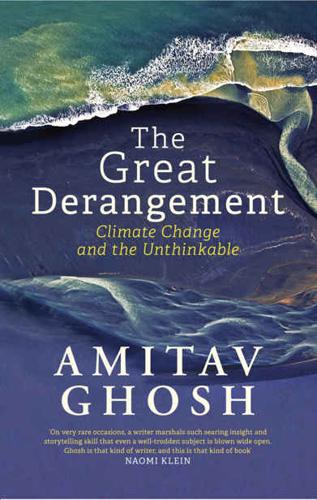
The Great Derangement: Climate Change and the Unthinkable
by
Amitav Ghosh
Published 16 Jan 2018
.: Gateway Editions, 1949), 336. 40 ‘something uncanny’: Timothy Morton, Hyperobjects (Minneapolis: University of Minnesota Press, 2013), Kindle edition, loc. 554. 40 ‘menace and uncertainty’: George Marshall, Don’t Even Think about It: Why Our Brains Are Wired to Ignore Climate Change (New York: Bloomsbury, 2014), 95. 41 processes of thought: Cf. Eduardo Kohn, How Forests Think: Toward an Anthropology beyond the Human (Berkeley: University of California Press, 2013). 43 relationship with the non-human: Cf. Michael Shellenberger and Ted Nordhaus, ‘The Death of Environmentalism: Global Warming Politics in a Post-Environmental World’ (Oakland, CA: Breakthrough Institute, 2007): ‘The concepts of “nature” and “environment” have been thoroughly deconstructed. Yet they retain their mythic and debilitating power within the environmental movement and the public at large’ (12). 44 ‘post-natural world’: Bill McKibben, The End of Nature (New York: Random House, 1989), 49. 51 tides and the seasons: Anuradha Mathur and Dilip da Cunha make this point at some length in their excellent book, SOAK: Mumbai in an Estuary (New Delhi: Rupa Publications, 2009). 51 and on Salsette: I am grateful to Rahul Srivastava, the urban theorist and cofounder of URBZ (http://urbz.net/about/people/), for this insight. 51 a chest of tea: Bennett Alan Weinberg and Bonnie K.

Who Stole the American Dream?
by
Hedrick Smith
Published 10 Sep 2012
Newman, Xiao-Yin Jin, et al., “High Tech Indicators: Technology-Based Competitiveness of 33 Nations” (Atlanta, GA: Technology Policy and Assessment Center, Georgia Tech University, 2008), http://www.tpac.gatech.edu. 40 Ranked the United States fifth “U.S. Falls to 5th in Global Competitiveness, Survey Shows,” Associated Press, September 7, 2011. 41 The trends in patents National Academy of Sciences, Gathering Storm, Revisited. 42 The United States will soon be importing Rob Atkinson, Michael Shellenberger, Ted Nordhaus, et al., “Rising Tigers, Sleeping Giant: Asian Nations Set to Dominate the Clean Energy Race by Out-Investing the United States,” Breakthrough Institute and Information Technology and Innovation Foundation, November 2009, http://www.thebreakthrough.org. 43 It will take dramatically expanding government funding National Academy of Sciences, Gathering Storm, appendix E, recommendations called for $13 billion a year in government spending for a decade, starting in 2007. 44 Obama provided a kick start President Barack Obama, remarks, National Academy of Sciences, April 27, 2009; “Fact Sheet: A Historic Commitment to Research and Education,” April 27, 2009, http://www.whitehouse.gov. 45 Obama put $400 million Matthew L.
…
Center on Budget and Policy Priorities, Washington, DC, March 29, 2007. Atkinson, Robert D., and Scott M. Andes. “The Atlantic Century II: Benchmarking EU and U.S. Innovation and Competitiveness.” Information Technology and Innovation Foundation, Washington, DC, July 2011. Atkinson, Rob, Michael Shellenberger, Ted Nordhaus, et al. “Rising Tigers, Sleeping Giant: Asian Nations Set to Dominate the Clean Energy Race by Out-Investing the United States.” Breakthrough Institute; Information Technology and Innovation Foundation, Washington, DC, November 2009. Baker, Dean. “The Productivity to Paycheck Gap: What the Data Show.”

How to Run the World: Charting a Course to the Next Renaissance
by
Parag Khanna
Published 11 Jan 2011
Jason DeParle, “Western Union Empire Moves Migrant Cash Home,” The New York Times, November 22, 2007. 10. Ibid., “A Good Provider Is One Who Leaves,” The New York Times Magazine, April 22, 2007. Chapter Ten: Your Planet, Your Choice 1. Scott Borgerson, “Sea Change,” Atlantic Monthly, December 2008, 88–89. 2. Ted Nordhaus and Michael Shellenberger, “Scrap Kyoto,” Democracy, Summer 2008. 3. Lydia Polgreen, “Mali’s Farmers Discover a Weed’s Potential Power,” The New York Times, September 9, 2007. 4. Adapted from SustainAbility, http://www.sustainability.com. 5. Benedict Kingsbury, Nico Krisch, and Richard Stewart, “The Emergence of Global Administrative Law,” Law and Contemporary Problems 68 (Summer/Autumn 2005).
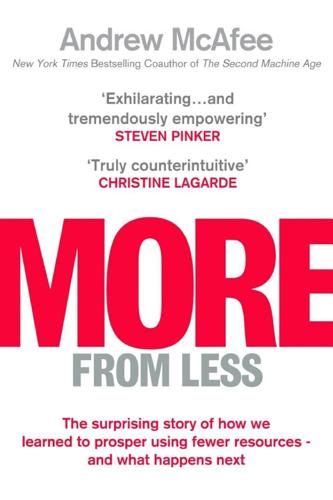
More From Less: The Surprising Story of How We Learned to Prosper Using Fewer Resources – and What Happens Next
by
Andrew McAfee
Published 30 Sep 2019
As I mentioned in the introduction, Jesse Ausubel’s essay “The Return of Nature,” published in the Breakthrough Journal, got me started down the path of investigating how we were able to turn the corner and start getting more from less. Jesse provided advice and encouragement, and answered many questions, as did his collaborators at Rockefeller University, Iddo Wernick and Alan Curry. At the Breakthrough Institute Ted Nordhaus, Alex Trembath, Linus Blomquist, and Rachel Pritzker were beyond welcoming. Back home at MIT my colleagues at the Initiative on the Digital Economy created an ideal environment for this work and lots of other research. David Verrill and Christie Ko kept the place running smoothly, Adjovi Koene took a lot of tasks off my plate, and Seth Benzel and Daniel Rock were great sounding boards for the work as it progressed.

The Uninhabitable Earth: Life After Warming
by
David Wallace-Wells
Published 19 Feb 2019
“nature is thriving”: Thomas’s book is Inheritors of the Earth: How Nature Is Thriving in an Age of Extinction (New York: Public Affairs, 2017), and while it offers not so much a full-throated celebration of what he calls an “age of extinction” but a more modest proposal that we view the positive, generative effects of climate change alongside its crueler impacts. This is a note of contrarian optimism echoing Michael Shellenberger and Ted Nordhaus, in their Break Through: Why We Can’t Leave Saving the Planet to Environmentalists and Love Your Monsters: Postenvironmentalism and the Anthropocene; and the Canadian, Swedish, and South African academics behind the research collaboration “Bright Spots,” who, despite considerably more concern about the effects of global warming, nevertheless keep a running list of positive environmental developments they believe makes the case for what they call a “good Anthropocene.”

The Moon: A History for the Future
by
Oliver Morton
Published 1 May 2019
For various sorts of information, inspiration and practical help, I would like to thank Oded Aharonson, Eric Asphaug, Stewart Brand, Holly Jean Buck, Niall Campbell, Andrew Chaikin, Carissa Christensen, Charles Cockell, Ashley Conway, Olaf Corry, Ian Crawford, Martin Elvis, Jeff Foust, Mike French, Trevor Hammond, Bill Hartmann, Jim Head, Tracy Hester, Scott Hubbard, Laura Joanknecht, Roz Kaveney, John Kessel, Jeff Lewis, Simon Lewis, Simon Lock, John Logsdon, Neil Maher, Will Marshall, Chris McKay, Jay Melosh, Farah Mendelsohn, Philip Metzger, Clive Neal, Ted Nordhaus, Ted Parson, Stephen Pumfrey, Bob Richards, Paul Robbins, Stan Robinson, Simon Schaffer (as always), Jean Schneider, Rusty Schweickart, Sarah Stewart, Timothy Stubbs, Bron Szerszynski, David Waltham, Dennis Wingo, Nick Woolf, Pete Worden and Kevin Zahnle. Three meetings held during 2018 were extremely helpful to me in shaping the book’s themes: I am very grateful to the organisers of and participants at the 49th Lunar and Planetary Science Symposium in Houston and its preceding Brown/Vernadsky micro symposium; to Daniel Zizzamia and the participants at the Planetary Designs workshop at Harvard; and to Bron Szerszynski, Katarina Damjanov and the participants at the Multiplanetary Futures meeting at the University of Lancaster.

How Big Things Get Done: The Surprising Factors Behind Every Successful Project, From Home Renovations to Space Exploration
by
Bent Flyvbjerg
and
Dan Gardner
Published 16 Feb 2023
“Addressing Governance Errors and Lies in Project Forecasting.” Academy of Management Perspectives, forthcoming. Lovallo, Dan, and Daniel Kahneman. 2003. “Delusions of Success: How Optimism Undermines Executives’ Decisions.” Harvard Business Review 81 (7): 56–63. Lovering, Jessica R., Arthur Yip, and Ted Nordhaus. 2016. “Historical Construction Costs of Global Nuclear Power Reactors.” Energy Policy 91: 371–82. Luberoff, David, and Alan Altshuler. 1996. Mega-Project: A Political History of Boston’s Multibillion Dollar Central Artery/Third Harbor Tunnel Project. Cambridge, MA: Taubman Center for State and Local Government, Kennedy School of Government, Harvard University.
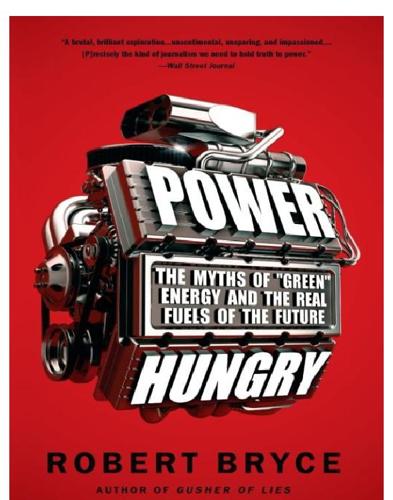
Power Hungry: The Myths of "Green" Energy and the Real Fuels of the Future
by
Robert Bryce
Published 26 Apr 2011
As the global economy continues to shift, cheap energy will allow more people to travel farther to find jobs. And, as always, cheap energy will allow for greater increases in productivity. But the United States must not only aim to have cheap energy at home, it must pursue that goal globally. As Michael Shellenberger and Ted Nordhaus of the Breakthrough Institute have declared, “we need to make clean energy cheap worldwide.”9 The pursuit of cheap energy means pursuing N2N. Natural gas and nuclear power offer the best no-regrets energy policy because they reduce the volumes of neurotoxins released into the environment, cut solid waste production, slash greenhouse gases, eliminate air pollution, and obviate the need for carbon capture and sequestration.

Whole Earth: The Many Lives of Stewart Brand
by
John Markoff
Published 22 Mar 2022
Schwartz went public first beginning in 2003 with an article in Wired arguing that nuclear could be a “stopgap” while other sustainable energy sources matured.[6] Two years later he gave a more full-throated endorsement of nuclear power with another article, coauthored with Spencer Reiss, that proclaimed “Nuclear Now!”[7] In 2003, two renegade environmental activists, Michael Shellenberger and Ted Nordhaus, had created the Breakthrough Institute to promote technological solutions to environmental problems, departing from the environmental movement’s opposition to nuclear power. The next year they published a manifesto titled “Is Environmentalism Dead?” that touched off a heated debate about nuclear power within the American environmental movement, with Shellenberger and Nordhaus being attacked by a range of mainstream environmentalists led by Carl Pope, the president of the Sierra Club.
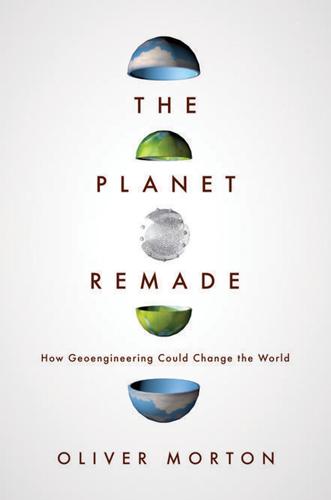
The Planet Remade: How Geoengineering Could Change the World
by
Oliver Morton
Published 26 Sep 2015
On top of the opportunities to listen, talk and socialise at various geoengineering meetings and summer schools in Asilomar, Berlin, Big Sur, Calgary, both Cambridges, Edinburgh, Heidelberg, Lisbon, Oxford, Potsdam, Santa Cruz and Waterloo, I have enjoyed similar stimulation at the Breakthrough Dialogues convened by Ted Nordhaus and Michael Shellenberger. I am also very grateful to NCAR for a media fellowship in 2009 and to the Skoll Foundation and Sundance Institute for their ‘Stories of Change’ project. At a number of these venues it has been a pleasure to work alongside various other writers interested in this most fascinating topic, including Catherine Brahic, Jamais Cascio, Christopher Cokinos, Jeff Goodell, Eli Kintisch, Fred Pearce, Andy Revkin, Jon Vidal and Gaia Vince.
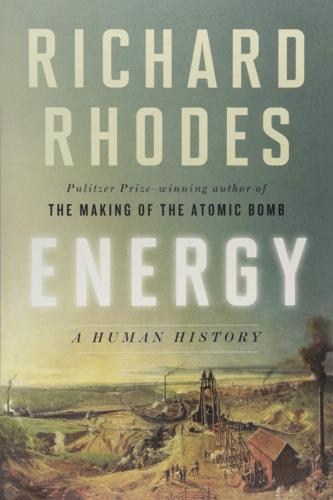
Energy: A Human History
by
Richard Rhodes
Published 28 May 2018
Amherst, NY: Humanity Books, 2004. Shapin, Steven. “The Invisible Technician.” American Scientist 77, no. 6 (1989): 554–63. Shapin, Steven, and Simon Schaffer. Leviathan and the Air-Pump: Hobbes, Boyle, and the Experimental Life. Princeton, NJ: Princeton University Press, 1985. Shellenberger, Michael, and Ted Nordhaus. “Environmental Apocalypse Is a Myth.” San Francisco Chronicle online, June 7, 2013. Sheppard, Muriel Earley. Cloud by Day: The Story of Coal and Coke and People. Uniontown, PA: Heritage, 1947. Sherman, William H. “Patents and Prisons: Simon Sturtevant and the Death of the Renaissance Inventor.”
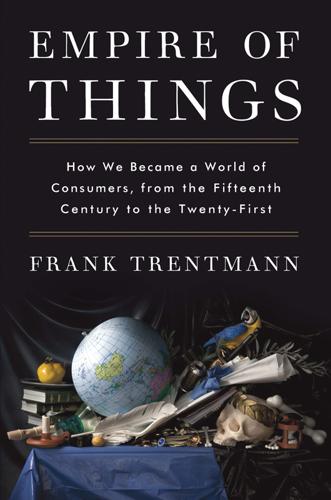
Empire of Things: How We Became a World of Consumers, From the Fifteenth Century to the Twenty-First
by
Frank Trentmann
Published 1 Dec 2015
Department of Energy and Climate Change, ‘Energy Consumption in the United Kingdom’, 2012; Eurostat: http://epp.eurostat.ec.europa.eu/tgm/table.do?tab=table&plugin=1&language=en&pcode=tsdpc310. 122. The size of the rebound effect and how to measure it remains a subject of considerable controversy. The International Energy Agency, in its World Energy Outlook in 2012, reckoned it to be a modest 9%. Other experts reach 50%: e.g. Ted Nordhaus, Michael Shellenberger & Jesse Jenkins, Energy Emergence: Rebound and Backfire as Emergent Phenomena (Oakland, MD, 2011). 123. 2011 ‘Consommation durable’ fair, Paris: ADEME (French environment and energy management agency), Petites réponses, 9. 124. 1993: 10.01 quadrillion Btu vs 10.17 quadrillion Btu in 2009: US Energy Information Administration, Residential Energy Consumption Survey, 2009. 125.